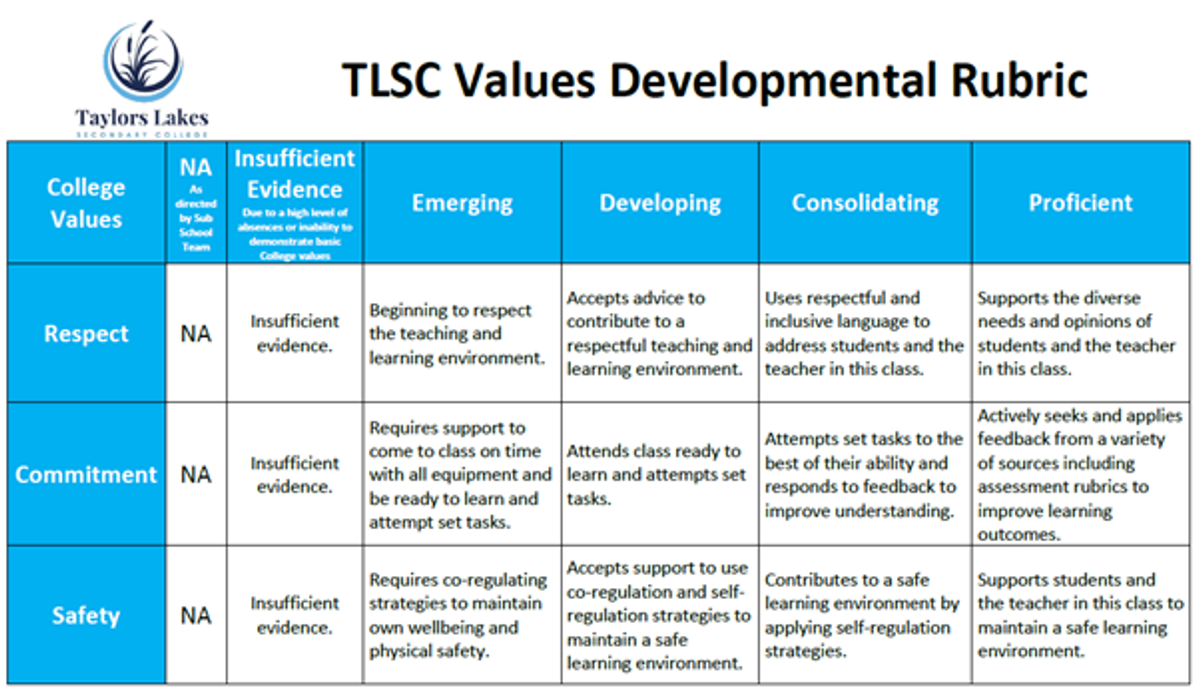Changes to Assessment
and Reporting for 2023

Changes to Assessment
and Reporting for 2023
Significant changes have been implemented this year in relation to the College’s assessment and reporting processes to further support our commitment to improving student outcomes. School Council has recently endorsed the newly updated Assessment, Feedback and Reporting Policy (available on the TLSC website) which will guide our implementation of developmental rubrics for reporting student achievement in Years 7-10 as well as changes to our Progress Reports for all students at the College.
The College will be moving away from using the terminology of Distinction, Credit, Satisfactory and Not Satisfactory for Summative Learning Tasks to ensure that students and parents are receiving accurate feedback reflective of Standards-based achievement mapped against the Victorian Curriculum.
The following assessment grades will now be implemented:
Well above standard
The student is able to work two levels above the nominally age expected level of achievement. Evidence of the knowledge and skills as demonstrated by the student has occurred most often at two levels above the expected level across the whole developmental rubric.
Above standard
The student is able to work one level above the nominally age expected level of achievement. Evidence of the knowledge and skills as demonstrated by the student has occurred most often at one level above the expected level across the whole developmental rubric.
At standard
The student is able to work at the expected level of achievement. Evidence of the knowledge and skills as demonstrated by the student has occurred most often at the expected level across the whole developmental rubric.
Approaching standard
The student is working one level below the nominally age expected level of achievement. Evidence of the knowledge and skills as demonstrated by the student has occurred most often at one level below the expected level across the whole developmental rubric.
Below standard
The student is working two levels or more below the nominally age expected level of achievement. Evidence of the knowledge and skills as demonstrated by the student has occurred most often at two levels or more below the expected level across the whole developmental rubric.
Insufficient evidence
The student has been present and submitted a task, however evidence of the knowledge and skills required by the student has been insufficient across the whole developmental rubric.
Not submitted
Where a student has been present during a unit but does not submit a graded summative task by the due date, the teacher has the prerogative to provide an extension of up to one week and will communicate the time for the task to parents. If the student continues to not complete the task by the agreed time, the student will be graded as Not submitted.
Not Assessed
Where a student has been absent with school approval, a grade of Not assessed will be given only on the advice of the Principal Class and/or Sub-School Leader.
The College will be moving away from providing written comments for Summative Learning Tasks under the headings of What the student has achieved and Areas for improvement and focus on providing ongoing feedback to students throughout the course of a topic/unit to support their capacity to achieve to the best of their ability on a range of designated criteria for each task. Developmental Rubrics enables a framework where learning becomes visible for students.
Benefits for Students:
• Can set goals to self-assess and improve
• Can use specific feedback on their performance to support goal setting and engagement
• Can use assessment data/feedback as information rather than judgement
Benefits for Parents:
• Will know what their child can do
• Will know the next thing their child is ready to learn
Benefits for Teachers:
• Can target teaching and feedback to different developmental levels
• Focus on evidence of what students Say, Make, Write and Do
• Focus on next steps and progression, not deficits
Students and parents will have access to an assessed copy of the rubric via Compass which will showcase student achievement across a range of criteria. The shaded cell indicates what the student has demonstrated for each criteria and assumes that the description in each of the cells to the left of that have also been demonstrated. Descriptors to the right of a shaded cell indicate what the student could improve or aspire to. Students will also receive an overall on-balance assessment grade which will appear on Semester Reports.
Developmental Rubric Example
Criteria | Insufficient Evidence | Below standard | Approaching standard | At standard | Above standard | Well above standard |
Organisation | Insufficient evidence | Develops simple plan | Recounts a series of events | Has a beginning, middle and end | Has a climax and resolution | Uses text connectives to progress ideas |
Language features | Insufficient evidence | Lists ideas | Connecting ideas | Uses literal descriptions
| Uses figurative language | Uses a variety of language features to create different levels of meaning |
Vocabulary | Insufficient evidence | Uses cause-and-effect language | Uses common words and phrases | Selects Tier 2 words appropriate to the story
| Uses a variety of vocabulary for precision and impact
| Experiments with language connotations to evoke mood or build detail |
Author’s intention
| Insufficient evidence | Retells an existing story | Uses existing characters or setting to create their own story | Writes to convey an original story | Implies a message or lesson | Embeds a message for readers to infer |
Overall Grade: At standard
The College will be moving away from using the terminology of Completion of work, Effort, Behaviour and Organisation for Progress Reports to ensure that all students are focused on developing an understanding of the College values and the importance of their implementation in the classroom.
The following values will now be implemented:
Respect
We show respect and value diversity through the way we communicate and empathise with each other. We care for our college community and learning environments.
Commitment
We show commitment to our academic, social and emotional growth. We strive to achieve our personal best and support others to do the same.
Safety
We acknowledge everyone’s right to feel safe at school. We promote physical, emotional and intellectual safety and encourage everyone to take responsible risks in their learning.


Students will still receive a numerical score out 4 as part of their GPA, however the focus will be on building a student’s capacity to demonstrate the College values to support both their individual academic and social development and the development of others.
Please note:This is a completely new rubric and philosophy being implemented for the first time at the College. As a result it is extremely important for students and parents to understand that it is not expected that a student’s previous GPA results will necessarily be an indication of their new GPA results. Students will be commencing a new journey focused on how they can more actively contribute as a positive member of the College community. Students will not be penalised (eg exclusion from excursions/activities) for low GPA ratings, but will be supported in setting improvement goals for the subsequent Progress Report cycles.
Rick Hudson
Assistant Principal